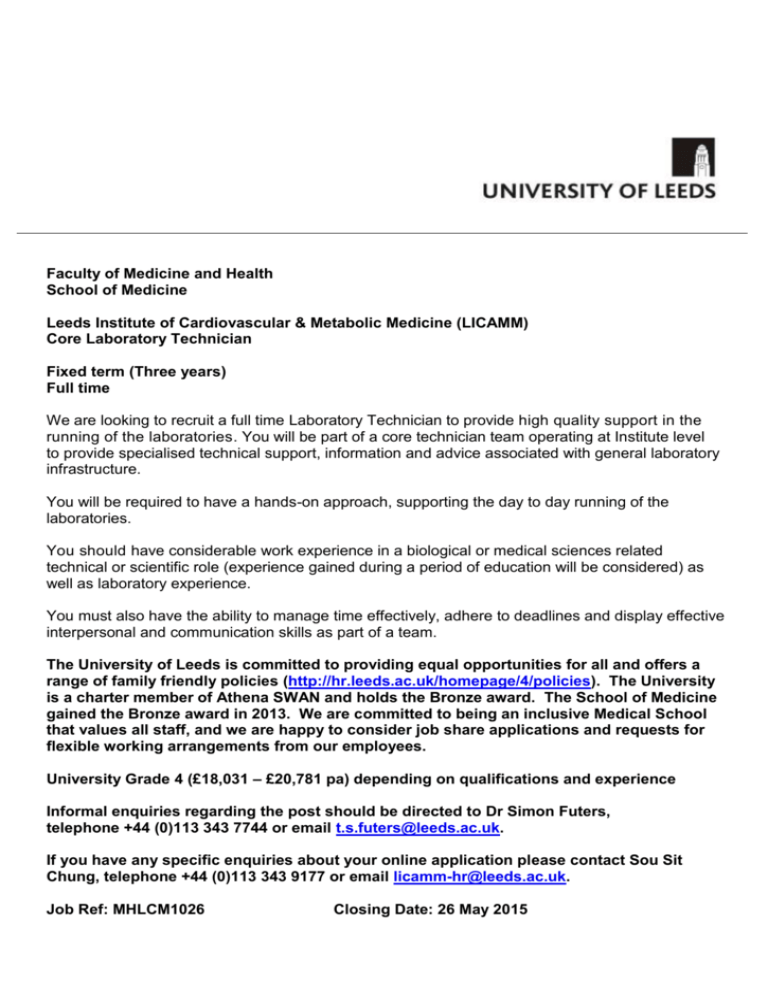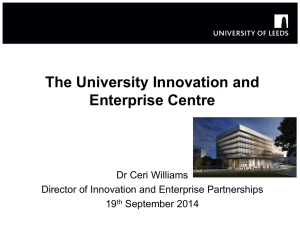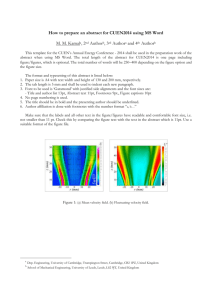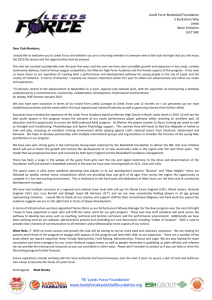Job Description - Jobs at the University of Leeds
advertisement

Faculty of Medicine and Health School of Medicine Leeds Institute of Cardiovascular & Metabolic Medicine (LICAMM) Core Laboratory Technician Fixed term (Three years) Full time We are looking to recruit a full time Laboratory Technician to provide high quality support in the running of the laboratories. You will be part of a core technician team operating at Institute level to provide specialised technical support, information and advice associated with general laboratory infrastructure. You will be required to have a hands-on approach, supporting the day to day running of the laboratories. You should have considerable work experience in a biological or medical sciences related technical or scientific role (experience gained during a period of education will be considered) as well as laboratory experience. You must also have the ability to manage time effectively, adhere to deadlines and display effective interpersonal and communication skills as part of a team. The University of Leeds is committed to providing equal opportunities for all and offers a range of family friendly policies (http://hr.leeds.ac.uk/homepage/4/policies). The University is a charter member of Athena SWAN and holds the Bronze award. The School of Medicine gained the Bronze award in 2013. We are committed to being an inclusive Medical School that values all staff, and we are happy to consider job share applications and requests for flexible working arrangements from our employees. University Grade 4 (£18,031 – £20,781 pa) depending on qualifications and experience Informal enquiries regarding the post should be directed to Dr Simon Futers, telephone +44 (0)113 343 7744 or email t.s.futers@leeds.ac.uk. If you have any specific enquiries about your online application please contact Sou Sit Chung, telephone +44 (0)113 343 9177 or email licamm-hr@leeds.ac.uk. Job Ref: MHLCM1026 Closing Date: 26 May 2015 Purpose of Post To provide high quality support in the running of the laboratories as part of a core technician team operating within the Institute to provide specialised technical support, information and advice associated with general laboratory infrastructure. A hands-on approach will be required supporting the day to day running of the laboratories. The successful candidate must also have the ability to manage time effectively, adhere to deadlines and display effective interpersonal and communication skills as part of a team. Main Duties & Responsibilities Support the maintenance of laboratory equipment, organising servicing, repairs, acquisition and maintenance of equipment. Ensure compliance with all relevant University Health and Safety legislation in both laboratories and offices. Ensure the efficient day-to-day running of laboratories including monitoring consumable supply levels, making solutions, autoclaving glassware, and maintaining areas in good order. Maintain specialised rooms ensuring they are in good order through a hands-on approach; ensuring good organisation and cleanliness, appropriate supply levels, and special cleaning (eg fumigation) when required. Ensuring clear, clean and organised work areas and well maintained fridge / freezers (including defrosts). Ensure communal areas are clean and tidy. Contribute to relevant laboratory meetings as required and disseminating information as required. Carrying out correct and safe disposal of waste, ensuring that other team members also follow correct procedures, following University health and safety guidelines. Provide assistance to laboratory staff ensuring health and safety standards are met. As a member of the Laboratory support team, work collaboratively to support the Principal Investigators and other laboratory based Institute staff. Support the technical team in planning, ordering and maintaining communal stores. Have a working knowledge of basic laboratory techniques including tissue culture (primary tissue and cell line), molecular (eg PCR, RT-PCR) and biochemical analyses (eg ELISA, western blot, HPLC). Relationships The post-holder is responsible to the Institute’s Technical Specialist in the Leeds Institute of Cardiovascular & Metabolic Medicine (LICAMM) – formerly known as Leeds Institute of Genetics, Health & Therapeutics (LIGHT), through whom he/she is accountable to the Laboratory Manager, Laboratory Lead, Director of Institute, the Dean of the Medical School and ultimately the Dean of the Faculty. University Values All staff are expected to operate in line with the University’s values and standards, which work as an integral part of our strategy and set out the principles of how we work together. More information about the University’s strategy and values is available at http://www.leeds.ac.uk/comms/strategy/ Person Specification Essential Considerable work experience in a biological or medical sciences related technical or scientific role (experience gained during a period of education will be considered) Experience of working in a biological or medical sciences based laboratory environment Evidence of practical laboratory skills and relevant research techniques which ideally should include experience of tissue culture (primary tissue or cell line), molecular (eg PCR, RTPCR) and biochemical analyses (eg ELISA, western blot, HPLC) Evidence of an ability to work effectively as part of a team in a busy working environment Knowledge of working to necessary laboratory Health and Safety guidelines Practical experience of using computer systems such as Word, Excel and PowerPoint Evidence of an ability to work independently, with initiative and attention to detail Experience of working to deadlines and managing own time effectively Excellent communication and Interpersonal skills Evidence of a proactive and flexible approach including a willingness to work flexibly at different sites if required Willingness to improve specialist knowledge Commitment to personal development for self and others and willingness to undertake training to support the role Desirable A levels including biology or chemistry and another science based subject or equivalent vocational qualifications (NVQ, City and Guild) Knowledge of University processes and procedures, in particular in relation to laboratory good practice, health and safety and laboratory procedures Proven ability to learn new systems and alternative ways of working Experience of developing or optimising laboratory methodologies Experience of training junior colleagues or students in laboratory based techniques Faculty Information With more than 6,000 students, 1,600 staff and annual research income of £50m, the Faculty of Medicine and Health at Leeds is bigger than some universities. Leeds has one of the largest medical and bioscience research bases in the UK, and is an acknowledged world leader in cancer, cardiovascular, psychiatric, genetic, musculo-skeletal and health services research. Treatments developed in Leeds are transforming the lives of people around the world living with conditions such as HIV, TB, diabetes and malaria. The School of Medicine The School of Medicine at the University of Leeds is a major international centre for research and education. Our ambition is to improve health and reduce health inequalities, locally and globally, through excellent scientific research and the translation of that research into healthcare practice, and through the education of future scientific and clinical leaders who will advocate and practise an evidence-based approach. Our major strategic aims are to: Deliver outstanding research including basic discovery science through to applied health research that makes a significant difference to health. Produce exceptional graduates, clinicians, educators, doctoral and post-doctoral fellows whose learning has been informed and inspired by our research excellence and who will form the next generation of academic and clinical leaders. Develop and support knowledge transfer activities that flow from our academic activities. Create and maintain an efficient and sustainable environment for research and teaching within an organisational culture and management style that enacts and supports the university’s core values of community, inclusiveness, integrity and professionalism. The School of Medicine is organised into seven Institutes. All are committed to high quality research-led teaching, through their training of postgraduate research students, delivery of postgraduate taught courses, and its leadership in undergraduate teaching. The School works closely with the local NHS, having a number of jointly funded clinical posts to ensure this relationship is effective and strong for both research and student education. Leeds Institute of Cardiovascular & Metabolic Medicine (LICAMM) Director: Professor Mark Kearney LICAMM integrates basic and clinical scientists with a common goal of understanding the mechanisms underpinning common chronic diseases of human health and developing new approaches to treating patients at an individual and population level. At the heart of LICAMM’s philosophy is a vibrant multidisciplinary approach to science that provides a platform to deliver internationally competitive translational research and teaching in disorders including cardiovascular disease, diabetes, cancer and neurodegenerative diseases. Our key aim is to improve the lives of our patients and the experience of our students. Leeds Institute of Health Sciences (LIHS) Director: Professor Tim Ensor LIHS delivers problem-driven research that supports decisions about the content or delivery of healthcare. Our interdisciplinary approach incorporates expertise in applied health research designs, health implementation sciences, social sciences, health economics, informatics and statistics, as well as skills in communicating with basic scientists, policy makers, healthcare providers, public and patients. We conduct research at the individual, population and organisational level. Leeds Institute of Medical Education (LIME) Director: Professor Trudie Roberts LIME provides the administrative support, co-ordination and leadership for the School of Medicine’s undergraduate medical degree, including admissions, curriculum development, assessment, student support and clinical placement liaison. It provides the technology-enhanced learning and innovation support for the School of Medicine. LIME also has a very active scholarship programme of research and innovation in medical education and uses its expertise to influence medical education policy and practice nationally and internationally. To achieve this it works with a range of stakeholders including the academic community, the profession, the public, regulators and policy makers. The Leeds Institute of Cancer and Pathology (LICAP) Director: Professor Tim Bishop The Leeds Institute of Cancer Studies and Pathology addresses both laboratory based and clinical research into cancer with a major focus on translational science. LICAP is one of the largest cancer Institutes in the country and has major financial support from the cancer charities. The laboratories and clinical research are all based on the St James’s site with laboratory activities being located in the Wellcome Trust Brenner Building and adjacent buildings while the clinical work is based within Bexley Wing. The Institute consists of seven Sections with the following interests: Leeds Institute of Biomedical & Clinical Sciences (LIBACS) Director: Professor Philip Hopkins LIBCS undertakes clinically-driven research from the level of the gene through cellular, tissue and organ to clinical trials. Our vision is to develop a sustainable centre of excellence for the advancement of patient care by translating research results into clinical practise and contributing to medical education at undergraduate and postgraduate levels. Our research interests are encapsulated in 6 clinical themes (Gastrointestinal inflammation & tumorigenesis, Genetic disorders, Infection & immunity, Neuroscience, Perinatal medicine, Perioperative outcomes & technologies) underpinned by 4 generic science technology strands (Animal models, Cell biology, Gene regulations & Genomics). We are based predominantly at the St James’s University Hospital site. Leeds Institute of Rheumatic and Musculoskeletal Medicine (LIRMM) Director: Professor Paul Emery LIRMM is dedicated to improving diagnosis, therapy, intervention and outcome across the spectrum of rheumatic and musculoskeletal medicine. It boasts a dynamic portfolio of research and education, delivering wide-ranging clinical, translational and basic research across five Sections: Clinical Musculoskeletal Medicine, Experimental Musculoskeletal Medicine, Clinical Biomechanics and Physical Medicine, Rehabilitation Medicine and Orthopaedics. A multidisciplinary approach is the core of our activities, with significant interdisciplinary links between Experimental and Clinical research. LIRMM’s clinical activities are focussed at Chapel Allerton Hospital, which is also base for our NIHR Musculoskeletal Biomedical Research Unit (LMBRU) and our basic sciences at St James’s University Hospital. Leeds Institute of Clinical Trials Research (LICTR) Director: Professor Julia Brown LICTR delivers innovative design, delivery and knowledge transfer in clinical trials research. Our multidisciplinary approach, in collaboration with basic scientists, clinicians, policy makers, healthcare providers, public and patients and University colleagues, delivers internationally competitive research and teaching that makes a significant contribution to the evidence base for healthcare delivery. The Institutes research is conducted through the Clinical Trials Research Unit where we have expertise in design and conduct of complex clinical trials incorporating novel designs to evaluate CTIMPs, complex interventions, diagnostics, medical devices and surgery. St James’s University Hospital Campus Infrastructure and Facilities (SCIF) Director: Professor Pam Jones This group covers activities that cover School of Medicine functions for Institutes at St James’s University Hospital that span more than one institute including biomedical research facilities, student education, IT, health and safety, estates, seminars, PGR studentships and business support functions. These functions help support the 5 adjacent buildings on the site. There are 3 Institutes with staff and students at St James’s: LICP (Leeds Institute of Cancer studies and Pathology), LIBACS (Leeds Institute of Biomedical and Clinical Sciences), LIRMM (Leeds Institute of Rheumatic and Musculoskeletal Medicine). These three institutes are dedicated to basic, translational, clinical and health research integrated with student education. Additional Information Terms and Conditions Details of the terms and conditions of employment for all staff at the university, including information on pensions and benefits, are available on the Human Resources web pages accessible via the links on the right hand side, or at http://hr.leeds.ac.uk/policies Disclosure and Barring Service Checks A Disclosure and Barring Service (DBS) Check is not required for this position. However, applicants who have unspent convictions must indicate this in the ‘other personal details’ section of the application form and send details to the Recruitment Officer. Disabled Applicants The post is located in the LIGHT Laboratories, Clarendon Way. Disabled applicants wishing to review access to the building are invited to contact the department direct. Additional information may be sought from the Recruitment Officer, email disclosure@leeds.ac.uk or tel + 44 (0)113 343 1723. Disabled applicants are not obliged to inform employers of their disability but will still be covered by the Equality Act once their disability becomes known. Further information for applicants with disabilities, impairments or health conditions is available in the applicant guidance.





